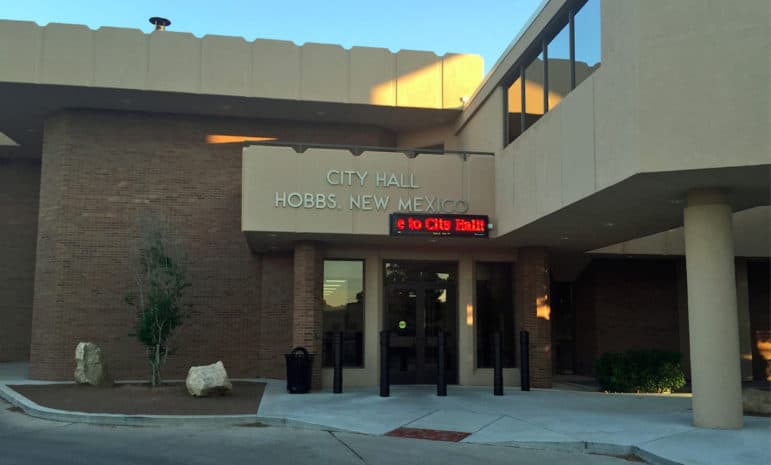
Courtesy photo
City Hall in Hobbs, N.M.
COMMENTARY: Since the presidential inauguration on Jan. 20, there’s plenty to keep our eyes glued to national politics, but I want to stress to my fellow Hobbsans and residents of other communities: There is so little that we can do to influence national politics, even the votes of our congressional delegation; the single greatest use of our time and energy to impact millions of our tax dollars is to get engaged with our local governments, both city and county.
Attend meetings, watch live and archived broadcasts of meetings, speak to your elected officials, request and review public documents, and when you see something, say something! You really can make a difference in and for your communities.
What prompts me to write this commentary is the now-annual tradition each January in Hobbs, wherein many city employees are given hour-for-hour cash payouts for their year-end excess paid time off (PTO). I previously shared a history of Hobbs’ questionable PTO policy in 2015 here and a follow-up of the 2016 payouts here.
While many employers, both public and private, have modernized their benefits to combine sick leave and vacation into one PTO pool, very few offer an annual payout to buy down excess hours above a set cap. Hobbs is the exception, with set caps of 320 hours for “all general employees” and 456 hours for “shift employees” of the fire and police departments, according to the municipal code.

Courtesy photo
Byron Marshall
When I first heard of this policy, it struck me as odd, and the fact is, it is. I call the unique City of Hobbs model “PTO+payout.” There are more than 100 municipalities in New Mexico, and yet I can only find that the City of Alamogordo cashes out PTO, but Alamogordo isn’t as freewheeling as Hobbs: it limits employees to cashing out no more than 80 hours per fiscal year at a rate of two hours of pay for every three hours of leave.
The lavish Hobbs policy was concocted by none other than John J. “J.J.” Murphy, just months after arriving in Hobbs from Pennsylvania to assume the role of city manager. Murphy has arguably benefited the most among city employees, receiving the highest payouts in 2015 and 2016 – $11,418 (gross pay, before taxes) and $12,242 (also gross), respectively. In addition, the PTO payouts look a lot like New Year’s bonuses, and the payout provision has reasonably helped Murphy curry favor with some employees, a situation that could have and should have been considered as an underlying motive for the policy change.
Seemingly confirming this hunch, during public comments at an Oct. 17, 2016, meeting, a city employee praised Murphy and told commissioners that the PTO program ushered in by Murphy is “not to be tampered with, reduced or removed,” now or in the future. View the public comments at 26:30.
Converting the city’s then-approximately 425 employees to PTO cost more than $1.4 million in 2013, but thereafter, Murphy said, the city would realize annual savings of about $400,000.
In a column last year about Hobbs’ PTO program, I called for the savings Murphy had projected to be verified. There’s been no report as yet by the city, and records obtained by way of an Inspection of Public Records Act request are suspicious. At the Jan. 3 commission meeting, Murphy said that the 2017 PTO payout would be $243,000 – over-budget by $10,000. However, the payout reported at the Jan. 3 meeting could not be validated, because the checks acquired through a corresponding IPRA request fell short and only totaled $210,447 in gross pay.
But, based on the information available to me, I can report a few obvious trends. While the total number of employees collecting PTO payouts has gone down in the fourth year, the average number of hours per employee has consistently gone up. Also increasing each year is the average before-tax payout to each employee.

The jury – er, the commission – appears to still be out on whether the city is saving actual money under Murphy’s PTO+payout policy, but one commissioner did take Murphy to task at the Jan. 3 meeting. Following Murphy’s presentation regarding 2017 PTO payouts, Commissioner Marshall Newman told Murphy, “We need to revisit this whole PTO thing. After an exchange with Murphy, Newman concluded, “At this point, I don’t see the savings.” Watch the presentation and discussion at 3:30.
Curiously, while the average PTO payout per employee reached new heights in 2017, Murphy’s piece of the plunder was $5,376 – less than half of each of the previous two years’ payouts. Why the dramatic drop? It seems the Office of the State Auditor might have an answer.
In the City of Hobbs audit report for the fiscal year ending June 30, 2015, published on the State Auditor’s website, finding No. FS 2015-002 (Page 175) stated that payroll discrepancies discovered during the audit could result in employees being “overpaid or underpaid or have inaccurate PTO balances.” Concluding FS 2015-002 in the audit report, “[m]anagement’s response” says that by the end of the 2016 fiscal year, the City of Hobbs would have the issues corrected, and corrective action would include “reiterating to its staff the importance of internal controls surrounding the payroll process and ensuring those controls are implemented and operating effectively.”
Well, recently published on the State Auditor’s website is the City of Hobbs audit report for the fiscal year ending June 30, 2016. The latest report includes a follow-up on the previous year’s findings, and the sequel of FS 2015-002 is even better than its debut, because the culprit is finally unmasked.
Page 177 of the fiscal year 2016 report states an “employee’s leave usage was not approved in the electronic time keeping system” and was instead “approved via email by the City Mayor.” The audit report further states that “the approved leave usage was not reconciled periodically to leave balances in the payroll system.” Since “[m]anagement did not deem it necessary to reconcile the approved time to the PTO balances in the payroll system,” the report reads, “[t]he potential impact … is that the employee could have inaccurate PTO balances.” In other words, the employee could, hypothetically, be notoriously frequently out of town but still collect an unjustifiably massive PTO payout.
It might seem unclear to which employee the audit finding is referring, but the “Management’s response” clarifies: “Historically City Manager time off requests are submitted via email and would then be approved by the Mayor and/or City Commissioner.”
Dun, dun, dunnnnnnn. And isn’t it worth asking the following: What about those previous payouts before the audit revealed the problem? Have they been reconciled? Paid back?
“Taking paid time off without appropriately charging leave balances is a gift of public funds.” At least that’s how California sees it. In 2010, an investigation into allegations a California State University employee “did not ensure that leave time was appropriately charged” resulted in a report that emphasized the California Constitution “prohibits the giving of any gift of public money or thing of value to any individual for a private purpose.”
Those familiar with New Mexico’s Constitution – which should include Hobbs’ city manager – would recognize this as getting into the territory of the anti-donation clause: “Neither the state nor any county, school district or municipality … shall directly or indirectly lend or pledge its credit or make any donation to or in aid of any person, association or public or private corporation…”
So, the question I ask is this: Did the city manager’s failure to reconcile his paid leave cause the city to make “a gratuitous transfer of property from one to another,” or to provide a gift, which New Mexico’s judiciary defined decades ago as “an allocation or appropriation of something of value, without consideration”? If the answer is “yes,” then the audit’s Finding No. FS 2015-002 rises at least to the level of a violation of the anti-donation clause.
In October, I wrote about an attempt by Mayor Sam Cobb, Murphy and the Hobbs News-Sun to pull a fast one on the taxpayers of Hobbs. With the headline “Hobbs transitioning to new city manager,” the News-Sun published a guest column by the mayor in which he summarized an eight-page severance agreement into two “key elements:” “1. Cessation of employment as City Manager on or before June 1, 2017;” and “2. A continuation of Mr. Murphy’s employment as a special consultant to the Mayor and City Commission through July 2, 2018.”
The News-Sun didn’t care to write an independent article about the severance agreement, which, if it had been approved, would have given Murphy full immunity for any wrongdoing while serving as the city manager: “City agrees not to bring any claims against Murphy for any events that have arisen or occurred prior to the Effective Date of this Agreement.”
Who does that? Certainly not someone with a clear conscience. Did he have the audit’s findings in mind when he sought immunity? Something else?
Since the News-Sun wouldn’t report on the severance agreement, I tried to share the features of the contract with the readers of the News-Sun by submitting my own letter to the editor. My fears were confirmed in the response that I received from the paper’s editorial management: the News-Sun has protected Murphy from scandal by suppressing “negative press,” dismissing news tips or critical letters to the editor so as not to hurt Murphy’s chances of leaving Hobbs. The News-Sun appears to be Murphy’s own public relations firm, with the hope that he would become some other city’s problem, rather than doing its job to hold him and others in power accountable.
To close, I feel obligated to disabuse the News-Sun and some fellow Hobbsans of a couple notions I’ve repeatedly heard:
- Recent “negative press” should not be blamed for Murphy’s unsuccessful attempts to leave Hobbs, and that list is getting longer. His tenure as the city administrator of Wilkes-Barre, Pa., prior to coming to Hobbs, is just a Google search away. But, if one wants to focus on the positive, just visit his own websites, jjmurphycitymanager.com, jjmurphycitymanager.wordpress.
com and jjmurphyhobbsnewmexico. wordpress.com. Really. - If Murphy is not hired elsewhere by the time his contract runs out in August, then that is not Hobbs’ problem. Hobbs is not obligated to give him a contract extension or to give him any other type of contract. Besides, the Hobbs gravy train rolls past August, anyway, because his current contract says that, “[b]y reasonable mutual agreement, [Murphy] shall be entitled to Severance in the event [his] Employment Agreement is not renewed.”
The search for Hobbs’ next city manager does not appear to have begun, but when it does, I hope my fellow Hobbsans will take what I said in this column’s opening to heart: get involved, Google the candidates, and when you see something, say something – especially to your respective commissioners. If we have learned anything over the last five years, it’s that too much is at stake to get it wrong.
Byron Marshall is a Hobbs High graduate and former NMSU student. In 2013, Marshall returned to Hobbs from Las Cruces to support and improve his community through activism and enhanced public dialogue about important — and often overlooked — issues that merit the community’s consideration. Agree with his opinion? Disagree? We welcome your views. Learn about submitting your own commentary here.